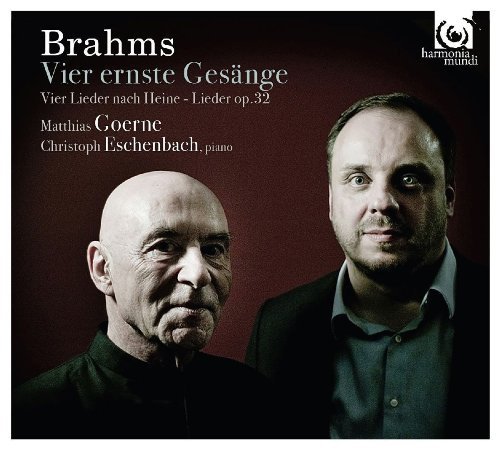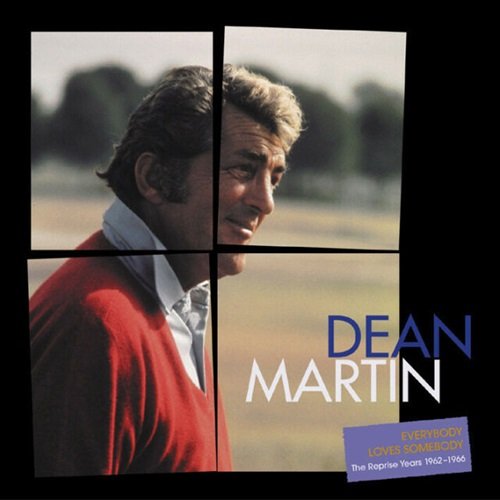Christoph Eschenbach & Matthias Goerne - Brahms: Vier ernste Gesänge (2016) [CD Rip]

Artist: Christoph Eschenbach, Matthias Goerne
Title: Brahms: Vier ernste Gesänge
Year Of Release: 2016
Label: Harmonia Mundi
Genre: Classical
Quality: FLAC (image + .cue, log, artwork)
Total Time: 55:48 min
Total Size: 204 MB
WebSite: Album Preview
Tracklist:Title: Brahms: Vier ernste Gesänge
Year Of Release: 2016
Label: Harmonia Mundi
Genre: Classical
Quality: FLAC (image + .cue, log, artwork)
Total Time: 55:48 min
Total Size: 204 MB
WebSite: Album Preview
Johannes Brahms
9 Lieder und Gesänge, Op. 32
I. Wie rafft ich mich auf in der Nacht
II. Nicht mehr zu dir zu gehen
III. Ich schleich umher betrübt und stumm
V. Der Strom, der neben mir verrauschte
V. Wehe, so willst du mich wieder
VI. Du sprichst,daβ ich mich täuschte
VII. Bitteres zu sagen denkst du
VIII. So stehn wir, ich und meine Weide
IX. Wie bist du, meine Königin
6 Lieder, Op. 85: I. Sommerabend
6 Lieder, Op. 85: II. Mondenschein
4 Lieder, Op. 9: I. Der Tod, das ist die kühle Nacht
4 Lieder, Op. 9: III. Es schauen die Blumen
4 Lieder, Op. 9: IV. Meerfahrt
Vier ernste Gesänge, Op. 121
I. Denn es gehet dem Menschen wie dem Vieh
II. Ich wandte mich, und sahe
III. O Tod, wie bitter bist du
IV. Wenn ich mit Menschen- und mit Engelszungen
It's the late Vier ernste Gesänge, Op. 121, that get the big print on the cover of this release by the awe-inspiring baritone Matthias Goerne, but actually the music on the album falls into a neat early-middle-late classification scheme. The group of middle-period settings of poetry by Heinrich Heine doesn't even get graphics on the cover, but these are fascinating. Brahms wrote a lot of songs, but you couldn't do better than the selection and performances here for a cornerstone collection item. Beyond the sheer beauty of Goerne's voice is an ability to shift gears to match how Brahms' style evolved. If you want to hear his real slashing, operatic high notes, check out the Lieder und Gesänge, Op. 32, settings of poems by the minor poets Georg Friedrich Daumer and Karl August Graf von Platen. These rather overwrought texts add up to a kind of slimmed-down Winterreise, and they catch the spirit of the still-young Brahms with his strong passions, elegantly controlled. The Heine settings, which come from several different sets of lieder, are not that often heard and are in some ways the most compelling of the group here. Goerne is a good deal quieter in these, except for a few bursts of emotion, and he draws the listener into Brahms' intricate phrase-rhythm recasting of Heine's deceptively simple rhymes. Sample Der Tod, der ist der kühle Nacht, Op. 96, No. 1, where Goerne keeps both Heine's four lines plus four and Brahms' three plus three plus two rhythms in your head at the same time. The Vier ernste Gesänge, Op. 121, the marquee attraction, are even more complicated in terms of the rhythm of the vocal lines of the songs. Brahms, the atheist, chose for this reflection on impending death (Clara Schumann's, and soon his own) biblical texts that don't mention God or Jesus, and devised a personal, reflective tone in response that relies on extremely subtle inflections of Martin Luther's prose texts. Goerne is clearly at the top of his powers here, and it would be difficult to find the results anything but haunting. This recording consists of a pair of sessions at Berlin's Teldex studios, held more than two and a half years apart. The sound is fine, but it would be nice to know who had the idea of putting them together on a single album. Whether it was Goerne or someone else, the final product is uniquely satisfying. -- James Manheim

![Demo Rumudo - Second Nature (2025) [Hi-Res] Demo Rumudo - Second Nature (2025) [Hi-Res]](https://www.dibpic.com/uploads/posts/2025-12/1765883076_cover.jpg)
![Betty Carter - The Music Never Stops (2019) [Hi-Res] Betty Carter - The Music Never Stops (2019) [Hi-Res]](https://www.dibpic.com/uploads/posts/2025-12/1765896843_bcmn500.jpg)





![Stefan Lovin - Heaven Shines Like Silver (2025) [Hi-Res] Stefan Lovin - Heaven Shines Like Silver (2025) [Hi-Res]](https://img.israbox.com/img/2025-12/12/iof4nx75kf3sa1i0vq1k07kqg.jpg)